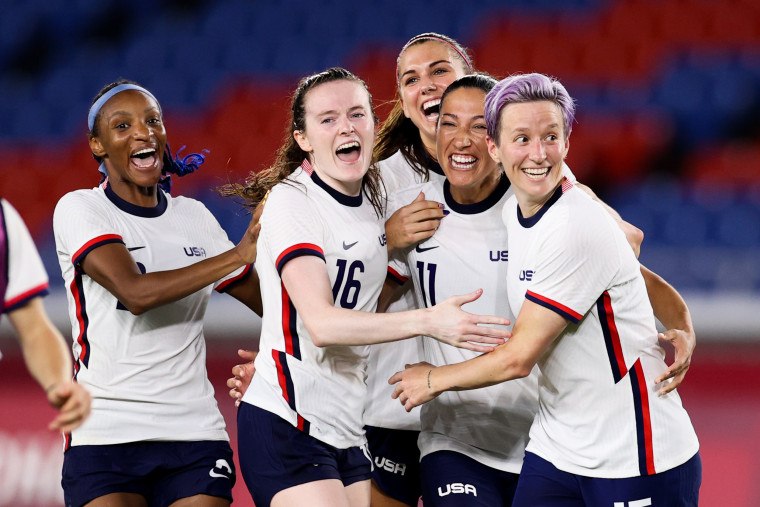U.S. women soccer stars, including Megan Rapinoe and Alex Morgan, have reached a $24 million settlement with the U.S. Soccer Federation following a lawsuit over unequal pay with men’s team players.
The landmark settlement was announced Tuesday, years after a group of five U.S. Women’s National Team players filed an Equal Employment Opportunity Commission complaint over inequality in pay and treatment.
According to the terms of the settlement, U.S. Soccer will pay men and women at an equal rate in the future in all friendlies and tournaments, including the World Cup.

"For us, this is just a huge win in ensuring that we not only right the wrongs of the past, but set the next generation up for something we only dreamed of,” Rapinoe said Tuesday on NBC's "TODAY" show.
"We are really in the midst of an incredible turning point in women’s sport," she said, adding, "If you’re not paying attention to this right now and what’s happening in women’s sport, you’re sleeping on the whole thing.”
The EEOC complaint was filed in 2016 by Morgan, Rapinoe, Becky Sauerbrunn, Hope Solo and Carli Lloyd (Solo and Lloyd are retired).
Then in March 2019, 28 members of the USWNT filed a lawsuit, citing years of ongoing institutionalized gender discrimination against the players in their compensation and working conditions.
The lawsuit garnered national attention and led to stadium chants of “Equal Pay!” when the U.S. women’s team won the 2019 World Cup in Paris.
The disparity in pay between men and women is stark. FIFA awarded $400 million in prize money for the 32 teams at the 2018 men’s World Cup, and $38 million to the champion, France. By comparison, FIFA awarded $30 million for the 24 teams at the 2019 women’s World Cup, including $4 million to the U.S. after winning their second straight title.
A global sensation and powerhouse in the sport, the U.S. team has won four FIFA Women’s World Cup titles since the competition’s founding in 1991.
That stands in stark contrast to the men’s national team, which took third in the first World Cup played in 1930 — and hasn’t come close since.
U.S. Soccer will pay $22 million to the players in the case and an additional $2 million into an account to benefit USWNT players in their post-career goals and charitable efforts related to women’s and girls’ soccer, according to the settlement terms. Players will be able to apply for up to $50,000 from this fund.
The legal back and forth in the case saw former U.S. Soccer Federation President Carlos Cordeiro resign in March 2020 in the wake of bitter backlash stemming from a legal filing that included sexist language comparing female and male players.
His resignation led former American midfielder Cindy Parlow Cone to become the first female president in the federation’s history.
The settlement is contingent on the ratification of a new Collective Bargaining Agreement for USWNT and U.S. Soccer, which will resolve all the claims in the 2019 suit.
Morgan said on "TODAY" their work in leveling the playing field is not over.
“U.S. Soccer has agreed to equalize the prize money moving forward, obviously we call on FIFA to truly equalize that for men's and women’s tournaments," she said. "That’s really what we set out to do. Equalize on all fronts."
"It’s a proud moment for all of us,” she added.
In a joint statement, the players and U.S. Soccer said: “Getting to this day has not been easy. The U.S. Women’s National Team players have achieved unprecedented success while working to achieve equal pay for themselves and future athletes. Today, we recognize the legacy of the past USWNT leaders who helped to make this day possible, as well as all of the women and girls who will follow.”